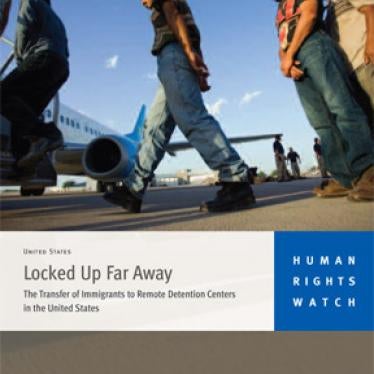Janet Napolitano
Secretary of Homeland Security
US Department of Homeland Security
Washington, DC 20528
Re: ICE review of detainee transfer policy
Dear Secretary Napolitano:
Human Rights Watch writes to urge you to direct the Immigration and Customs Enforcement (ICE) agency to release its updated detainee transfer policy for public comment. This policy has been in the drafting stage for one year but has yet to be released. ICE's current transfer policy and procedures contravene basic notions of fair treatment embedded in US constitutional law and in international human rights law binding on the United States, and therefore should be replaced.
On February 22, 2010, Phyllis Coven, Acting Director of the Office of Detention Policy and Planning, wrote to Human Rights Watch and stated that ICE was "conducting a comprehensive review of our detainee transfer policy." Ms. Coven also wrote that ICE intended to "minimize the number of detainee transfers to the greatest extent possible." One year later, we have received one short briefing on the matter during which ICE indicated its policy would be updated, but otherwise we have no further information about the comprehensive review, about the updated policy, or about any other policy changes intended to reduce the number of detainee transfers.
As you may recall, Human Rights Watch has reported extensively on ICE's excessive transfers of immigrant detainees and the harmful effects of such transfers. We documented over 1.4 million transfers between 1999 and 2008. The right to defend oneself against removal is clearly protected in US law [1] and in international human rights treaties.[2] Unnecessary transfers often interfere with a detainee's right to choose legal counsel and can sever an existing attorney-client relationship. Transfers also regularly disrupt a detainee's access to evidence or witnesses.
Human Rights Watch has also documented how transfers can result in unfair treatment of detainees facing immigration proceedings. Immigration courts interpret laws differently depending on where they are located. An immigration court in one federal circuit may treat a criminal conviction more seriously than another, impacting a detainee's ability to seek relief from deportation. In addition, transfers often unnecessarily lengthen the time an individual spends in detention, since they regularly disrupt bond procedures and decision making.
We are also concerned about the separation of detainees from their families and community of support as a result of transfers. A cross-country transfer can make it impossible for families to spend time with their loved ones and provide them support. Such separation exacts a heavy toll on a detainee's emotional and psychological well-being. That toll may negatively impact a person's ability to defend against deportation. Moreover, often such community and family members possess evidence or are needed as witnesses in immigration court, and transfers greatly hamper the ability of detainees to present such evidence or witnesses in their removal proceedings.
ICE has repeatedly stressed, in various forums, its desire to move towards a more civil detention system. A civil detention system should be built on basic standards of due process and should discard arbitrary policies that can result in unfair and even punitive treatment of immigrant detainees. Civil detention should include a rethinking and limiting of transfers, keeping detainees close to the jurisdiction of apprehension and near their attorneys, witnesses, evidence, communities of support, and family members.
We strongly urge you to direct ICE to follow through with its promised transfer reforms, including an updated policy. If a policy is still not ready for release, we would welcome the opportunity to meet to discuss this further. Should you have any questions or concerns, I can be reached at 202.612.4343 or at ginatta@hrw.org.
Sincerely,
Antonio M. Ginatta
Advocacy Director, US Program
Human Rights Watch
cc: Kevin Landy, Assistant Director, Office of Detention Policy and Planning, ICE
Margo Schlanger, Officer for Civil Rights and Civil Liberties, DHS
Andrew Lorenzen-Strait, Senior Public Engagement Officer, ISC/OSLTC
[1] Section 292, Immigration and Nationality Act of 1952, 8 USC §1362; 8 CFR §236.2 (a).
[2] International Covenant on Civil and Political Rights (ICCPR), adopted December 16, 1966, G.A. Res. 2200A (XXI), 21 U.N. GAOR Supp. (No. 16) at 52, U.N. Doc. A/6316 (1966), 999 U.N.T.S. 171, entered into force March 23, 1976, ratified by the United States on June 8, 1992, art. 13.







